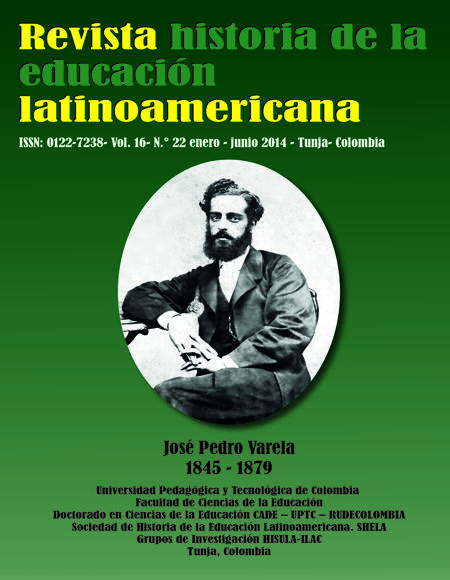Incident of the historical process in the argentine an educational process

Abstract
The article provides an overview and conceptual relationship on the Argentinean education. It presents the beginnings of the educational proposals, the presence of the positivist perspective, legislation on education in the nineteenth century, the university student presence, the incidence of the military dictatorship. A later project of country that tended to the industrial development and the corresponding federal law of education. The methodology used in this article, is to use historical data - without making a history of education - of the formal education process in Argentina in order to sustain the hypothesis that this has been set up on a double strand whose shadow extends up to the present. To achieve this goal and to check this hypothesis are evident: a) as the historical situations, through its thinkers and politicians and their more representative legislation, (B) How these have an impact on the present of the Argentinean educational process, in relation with particular to the primary and secondary level, c) generating a way sociocultural particular being. It is not intended to, therefore, to find a historical novelty; but a different way of reading, raising awareness about how to: a) the political and cultural decisions, B) taken in the past c) have not been harmless, d) What is a lesson for the present. These historical references make visible the struggles that, within the same Argentine society, the sides protagonists were generating. These were primarily religious pro or pro lay; and then these sides became in the federal and unitary, corrupted though, which lasted up to the present, not always in a national easy coexistence.Keywords
Journal History of the Latin American Education history, education, Argentina, dichotomies.
Author Biography
William Roberto Daros
Doctor en Filosofía, profesor en Letras (Córdoba),
licenciado en Filosofía (Rosario). Actualmente
es docente de filosofía e investigador principal en la Universidad del Centro Educativo Latinoamericano
(UCEL), del Consejo Nacional de Investigaciones
Científicas y Técnicas (CONICET). Forma parte, además, del Comité de Pares de la Comisión Nacional de Evaluación y Acreditación Universitaria (CONEAU) y de la Agencia Nacional de Promoción Científica y Tecnológica (ANPCyT), Ministerio de Cultura y Educación.
References
- Bonantini, C. Educación y sociedad. Análisis histórico estructural de la escuela media argentina. (Rosario: UNR, 1994.
- Charamonte, J. C. Nación y Estado en Iberoamérica. (Bs. As.: Sudamericana, 2004).
- Delich, F. La crisis en la crisis. Estado, Nación, Sociedad y Mercados en la Argentina contemporánea. (Bs. As., Eudeba, 2002).
- Durán Ramos, T. Globalización y formación profesional: ¿Nuevas reglas? en Educación. Revista de la Univer-sidad de Costa Rica, 2002, Vol. 26, nº 2, p. 107-117.
- Echeverría, E., Dogma socialista en Obras Completas. (Bs. As.: Casavalle, 1874. Tomo IV).
- Hernández Arregui, J. La formación de la conciencia nacional. (Bs. As.: Hachea, 1970) 55.
- Hernández, José. Martín Fierro. (Bs. As.; Quevedo, 2008).
- Hillert, F. y otros, El sistema educativo argentino. Antecedentes, formación y crisis. (Bs. As.: Cartago, 1985).
- Lértora de Mendoza, C. La enseñanza de la filosofía en tiempos de la colonia. Análisis de cursos manuscritos. (Buenos Aires: Fundación para la Educación, Ciencia y Cultura, 1979).
- Martínez Paz, F. La Educación Argentina. (Córdoba: Universidad Nacional, 1979).
- Mayochi, E. y otros. Fundamentos constitucionales del sistema educativo. (Bs. As.: Estrada, 1969).
- Mercante, V. Paidología. Estudio del alumno. (Bs. As.: M. Gleizer, 1927).
- Moreno, Mariano. Vida y memorias del Dr. Mariano Moreno en Memorias y Autobiografías. (Bs. As.: Museo Histórico Nacional, 1910, Tomo II).
- Muscará, F. Las ideas pedagógicas de fines del siglo XIX en los libros de lectura en Educación Cuyo, Nº 7, (1998), 165-188.
- Narozini, A. y otros. El rendimiento escolar en la Argentina. (Bs. As.: Losada, 2002).
- Pigna, F.Mariano Moreno, (Bs. As., Emecé, 2009).
- Pineau, Pablo. Sindicatos, Estado y Educación Técnica (1936-1968), Biblioteca Política Argentina. (Buenos Aires: Centro Editor de América Latina, 1991).
- Puiggrós, A. (Dir.) Historia de la Educación Argentina. (Buenos Aires, Galerna, 1992).
- Puiggrós, A. ¿Qué pasó en la Educación Argentina? Desde la Conquista hasta el Menemismo. (Buenos Aires, Kapelusz, 1996).
- Puiggrós, A. Escuela, Democracia y Orden, Historia de la Educación Argentina. (Buenos Aires: Editorial Galer-na, 1992.
- Rock, D. La Argentina autoritaria. Los nacionalistas, su historia y su influencia en la vida pública. (Bs. As.: Ariel, 1993).
- Romero, R. La Argentina en la escuela. Idea de nación en los textos escolares. (Bs. As.: Siglo XXI, 2004).
- Saavedra Lamas. Reformas orgánicas de la enseñanza pública: sus antecedentes y fundamentos. (Buenos Ai-res: Peuser, 1916).
- Salvadores, A. La instrucción primaria entre 1810 y la sanción de la ley 1420. (Bs. As.: Consejo Nacional de Educación, 1941).
- Sarmiento, D. F. Obras completas. (Bs. As.: Luz del Día, 1950, Tomo V) X-XII.
- Tedesco, J. Educación y sociedad en la Argentina (1880-1945). (Bs. As.: Solar, 1986).
- Tedesco, Juan Carlos. Educación y sociedad en la Argentina (1880-1945). Buenos Aires, Solar, 1986.
- Tenti Fanfani, E. (Comp.) El rendimiento escolar en la Argentina. (Bs. As.: Losada, 2002).
- Torrado, S. Estructura social de la Argentina: 1945-1983. (Bs. As.: De la Flor, 1994).